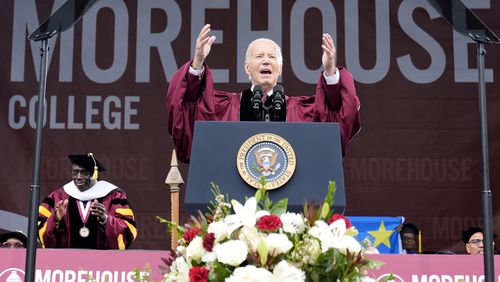Arkansas and Tennessee lawmakers on Monday approved banning transgender people from competing on school sports teams consistent with their gender identity, the latest states to advance the prohibition despite warnings of the devastating impact it could have on trans youth.
Republicans in at least 20 state legislatures have been pushing for similar bans this year. Mississippi’s governor signed a prohibition into law earlier this month.
In Tennessee, the GOP-led Statehouse approved a measure, 71-16, banning transgender athletes from participating in girls’ sports. Republican Gov. Bill Lee has not explicitly promised he would sign the bill, but has said transgender athletes would “destroy women’s sports” and remarked that transgender athletes would put “a glass ceiling back over women that hasn’t been there in some time.”
Arkansas Gov. Asa Hutchinson has said he supports his state’s new bill, which bans transgender girls and women from competing on school sports teams. The majority-Republican House voted 75-18 to send the bill to Hutchinson, who has stopped short of saying whether he’d sign it into law.
South Dakota Gov. Kristi Noem has said she would sign similar legislation sent to her but has since pushed for changing it to exclude college sports. On Monday night, Noem got into a verbal duel with Fox News’ Tucker Carlson, who accused the GOP governor — widely rumored as a potential White House nominee in 2024 — of abandoning her commitment to the measure.
“This bill would only allow the NCAA to bully South Dakota,” she said. “And it would actually prevent women from being able to participate in collegiate sports. So what I have done is I have asked the legislature ... to change the bill.”
“Wait,” Carlson interjected. “So you are saying the NCAA threatened you ... they said ‘If you sign this, we won’t allow girls in South Dakota to play’ and you don’t think you can win in court — even though the public overwhelmingly supports you nationally — and so you are caving to the NCAA?”
Noem dismissed Carlson’s insinuation as “completely wrong” and reiterated her commitment to protecting women’s sports.
Idaho has enacted a law curtailing trans students’ sports participation, and that 2020 measure is blocked by a court ruling as a lawsuit plays out.
National advocacy groups, including those representing pediatricians and social workers, have said the ban and other measures targeting trans youth risk further marginalizing a group already at high risk for bullying, depression and suicide.
“It’s extremely hard to be a kid, and if you’re a transgender kid, your life’s even harder,” Rep. Tippi McCullough, the top Democrat in the Arkansas House and the only openly gay member of the Legislature, said before the vote. “Sports gives kids a place to belong, a place to be included, a place to succeed or learn to deal with setbacks and work to overcome them.”
Arkansas’ proposal applies to K-12 and collegiate sports teams.
Rep. Sonia Barker, the bill’s sponsor, told the lawmakers the measure “creates fairness in women’s sports by establishing a level playing field for girls and women in our Arkansas schools.”
Under the bill, a student or school that suffers “direct or indirect harm” could take a school to court for violating the ban.
Hutchinson has five days, not counting Sunday, after the legislation reaches his desk to take action before it becomes law without his signature. If he vetoes the measure, it would take only a simple majority of the Legislature to override.
Hutchinson in 2017 opposed a “bathroom bill” that would have prohibited people from using restrooms in government buildings that do not match their gender at birth. That measure, which never advanced out of committee, had drawn opposition from tourism groups who said it would harm the state’s economy.
According to Tennessee’s bill, student-athletes would be required to prove that their sex matches that listed on the student’s “original” birth certificate in order to participate in public school sports in middle and high schools. If a birth certificate is unavailable, then the parents must provide another form of evidence “indicating the student’s sex at the time of birth.”
“Words do mean things. They are very important. This bill that I’m sponsoring maintains the competitive balance, the safety and the opportunity for scholarships and advancement for our female athletes,” said GOP Rep. Scott Cepicky, who refused to stray from that response when questioned by Democrats.
None of the supporters of the Tennessee measure could cite a single instance of transgender girls or boys having caused problems. A review by The Associated Press found only a few instances in which it has been an issue among the hundreds of thousands of American teenagers who play high school sports.
Backers of the bill argue that transgender girls, because they were identified as male at birth, naturally are stronger, faster and bigger than those identified as female at birth and therefore have an unfair advantage in sports.
Opponents counter that such proposals violate Title IX of federal education law prohibiting sex discrimination, as well as rulings by the U.S. Supreme Court and 11th U.S. Circuit Court of Appeals. Furthermore, others point to an executive order signed by Democratic President Joe Biden that prohibited discrimination based on gender identity in school sports and elsewhere.
The American Civil Liberties Union of Tennessee swiftly decried the bill as “shameful” after House passage, arguing that transgender girls do not threaten women’s sports.
“We urge Gov. Lee to reverse course and veto this bill or — should any transgender student be excluded because of this new law — we will see him in court,” Executive Director Hedy Weinberg said.
The Associated Press contributed to this report.
About the Author








